Analyzing Modern Society: A Comparison of Marx and Durkheim
VerifiedAdded on 2023/04/22
|8
|2173
|401
Essay
AI Summary
This essay provides a comparative analysis of Karl Marx and Emile Durkheim's perspectives on modern society. It explores the similarities and differences in their theories, focusing on concepts such as functionalism, class struggle, social solidarity, and the division of labor. The essay highlights Durkheim's emphasis on social facts, cultural norms, and the importance of maintaining harmony within society, while contrasting it with Marx's focus on class formation and the exploitative nature of the modern state. The analysis delves into their differing views on the role of citizens, the potential for social equality, and the impact of the division of labor on social cohesion, ultimately concluding that while both sociologists identified challenges within modern society, their proposed solutions and underlying ideologies diverge significantly. Desklib provides a platform to access similar solved assignments and study resources.
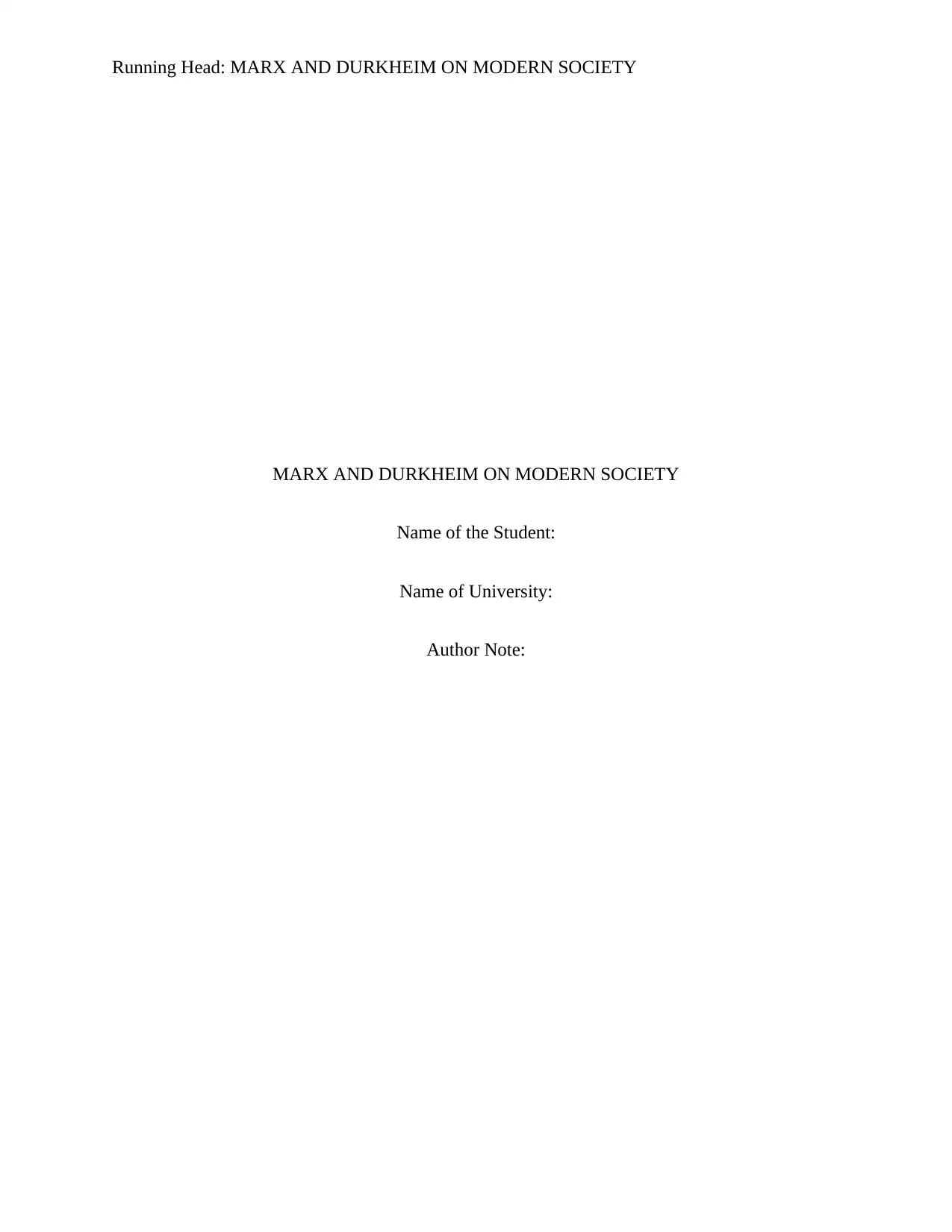
Running Head: MARX AND DURKHEIM ON MODERN SOCIETY
MARX AND DURKHEIM ON MODERN SOCIETY
Name of the Student:
Name of University:
Author Note:
MARX AND DURKHEIM ON MODERN SOCIETY
Name of the Student:
Name of University:
Author Note:
Paraphrase This Document
Need a fresh take? Get an instant paraphrase of this document with our AI Paraphraser
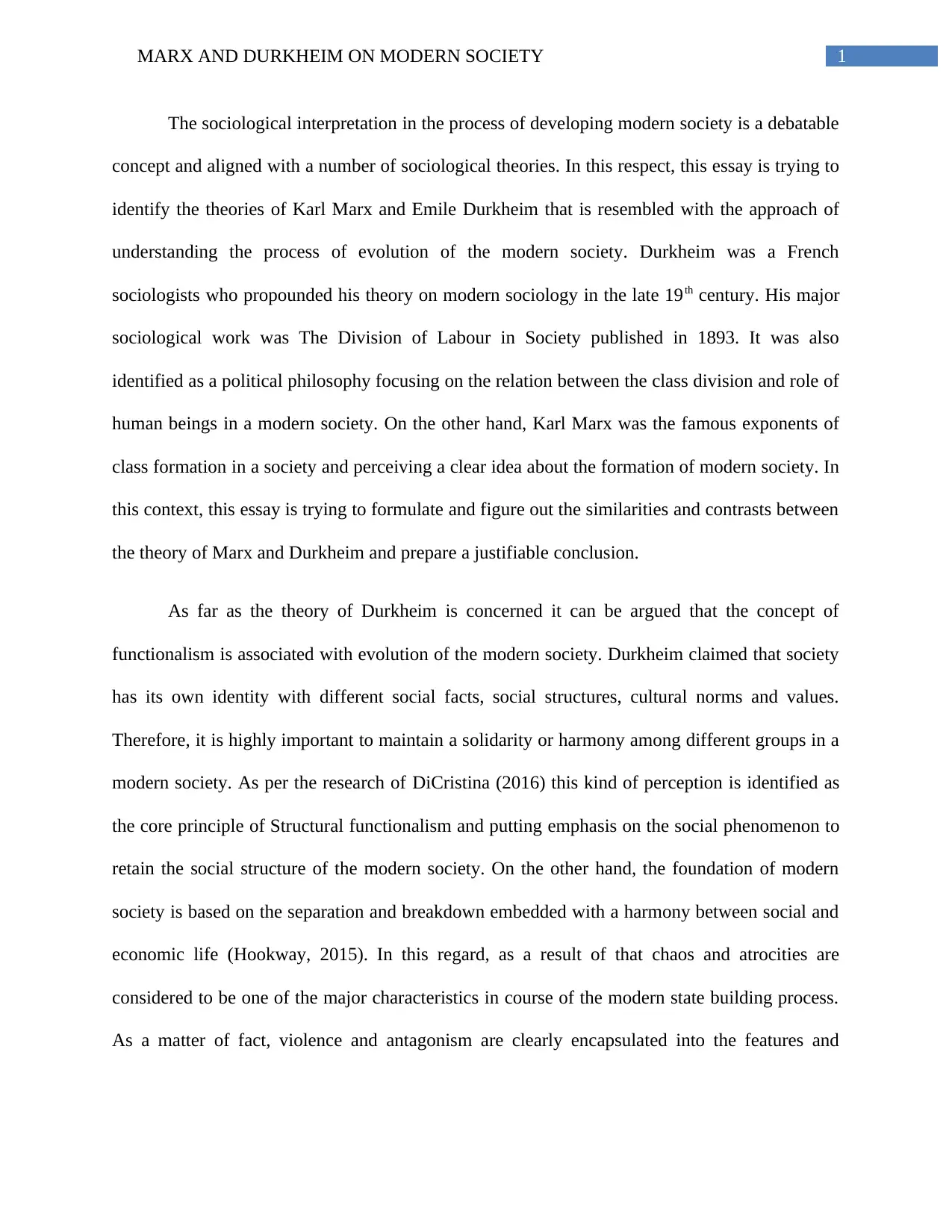
1MARX AND DURKHEIM ON MODERN SOCIETY
The sociological interpretation in the process of developing modern society is a debatable
concept and aligned with a number of sociological theories. In this respect, this essay is trying to
identify the theories of Karl Marx and Emile Durkheim that is resembled with the approach of
understanding the process of evolution of the modern society. Durkheim was a French
sociologists who propounded his theory on modern sociology in the late 19th century. His major
sociological work was The Division of Labour in Society published in 1893. It was also
identified as a political philosophy focusing on the relation between the class division and role of
human beings in a modern society. On the other hand, Karl Marx was the famous exponents of
class formation in a society and perceiving a clear idea about the formation of modern society. In
this context, this essay is trying to formulate and figure out the similarities and contrasts between
the theory of Marx and Durkheim and prepare a justifiable conclusion.
As far as the theory of Durkheim is concerned it can be argued that the concept of
functionalism is associated with evolution of the modern society. Durkheim claimed that society
has its own identity with different social facts, social structures, cultural norms and values.
Therefore, it is highly important to maintain a solidarity or harmony among different groups in a
modern society. As per the research of DiCristina (2016) this kind of perception is identified as
the core principle of Structural functionalism and putting emphasis on the social phenomenon to
retain the social structure of the modern society. On the other hand, the foundation of modern
society is based on the separation and breakdown embedded with a harmony between social and
economic life (Hookway, 2015). In this regard, as a result of that chaos and atrocities are
considered to be one of the major characteristics in course of the modern state building process.
As a matter of fact, violence and antagonism are clearly encapsulated into the features and
The sociological interpretation in the process of developing modern society is a debatable
concept and aligned with a number of sociological theories. In this respect, this essay is trying to
identify the theories of Karl Marx and Emile Durkheim that is resembled with the approach of
understanding the process of evolution of the modern society. Durkheim was a French
sociologists who propounded his theory on modern sociology in the late 19th century. His major
sociological work was The Division of Labour in Society published in 1893. It was also
identified as a political philosophy focusing on the relation between the class division and role of
human beings in a modern society. On the other hand, Karl Marx was the famous exponents of
class formation in a society and perceiving a clear idea about the formation of modern society. In
this context, this essay is trying to formulate and figure out the similarities and contrasts between
the theory of Marx and Durkheim and prepare a justifiable conclusion.
As far as the theory of Durkheim is concerned it can be argued that the concept of
functionalism is associated with evolution of the modern society. Durkheim claimed that society
has its own identity with different social facts, social structures, cultural norms and values.
Therefore, it is highly important to maintain a solidarity or harmony among different groups in a
modern society. As per the research of DiCristina (2016) this kind of perception is identified as
the core principle of Structural functionalism and putting emphasis on the social phenomenon to
retain the social structure of the modern society. On the other hand, the foundation of modern
society is based on the separation and breakdown embedded with a harmony between social and
economic life (Hookway, 2015). In this regard, as a result of that chaos and atrocities are
considered to be one of the major characteristics in course of the modern state building process.
As a matter of fact, violence and antagonism are clearly encapsulated into the features and
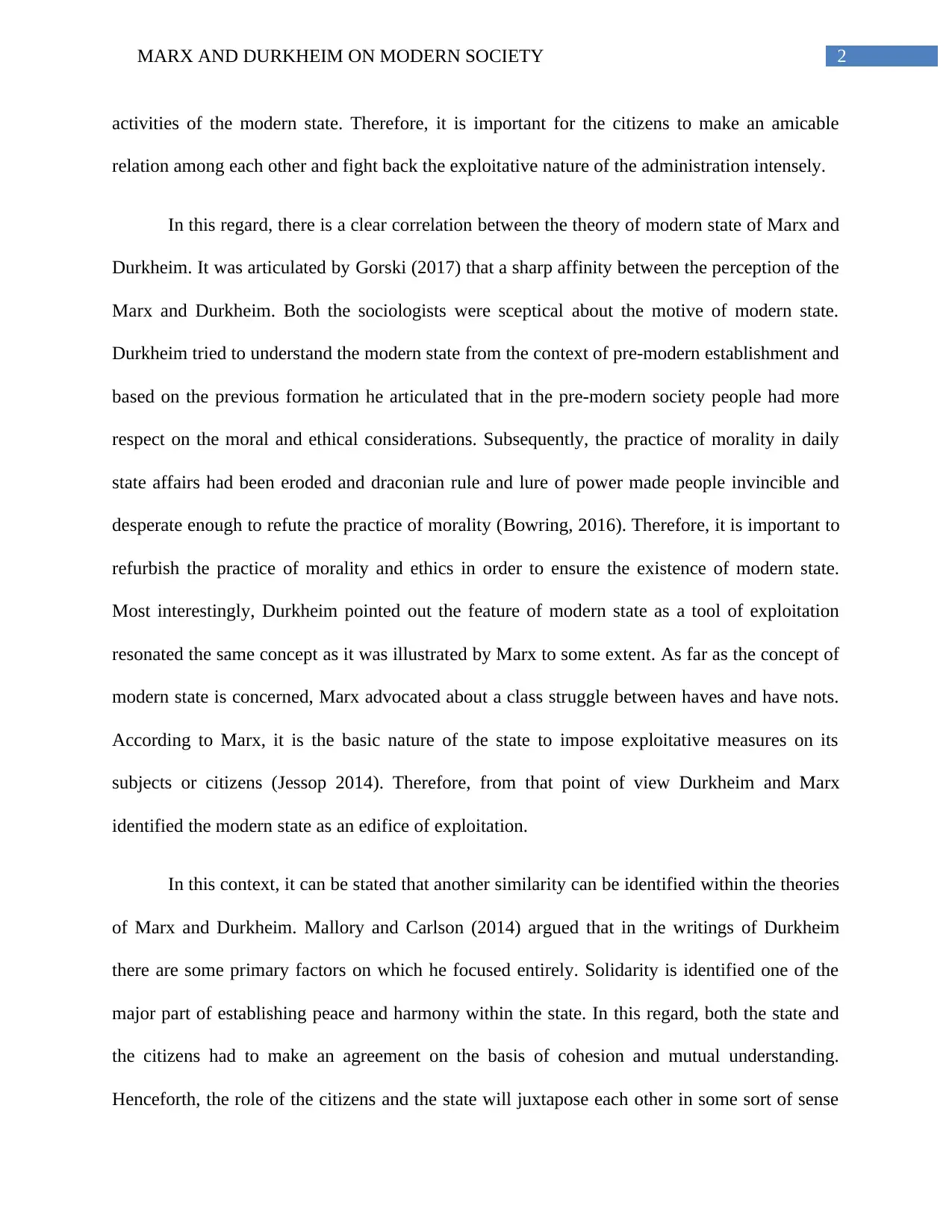
2MARX AND DURKHEIM ON MODERN SOCIETY
activities of the modern state. Therefore, it is important for the citizens to make an amicable
relation among each other and fight back the exploitative nature of the administration intensely.
In this regard, there is a clear correlation between the theory of modern state of Marx and
Durkheim. It was articulated by Gorski (2017) that a sharp affinity between the perception of the
Marx and Durkheim. Both the sociologists were sceptical about the motive of modern state.
Durkheim tried to understand the modern state from the context of pre-modern establishment and
based on the previous formation he articulated that in the pre-modern society people had more
respect on the moral and ethical considerations. Subsequently, the practice of morality in daily
state affairs had been eroded and draconian rule and lure of power made people invincible and
desperate enough to refute the practice of morality (Bowring, 2016). Therefore, it is important to
refurbish the practice of morality and ethics in order to ensure the existence of modern state.
Most interestingly, Durkheim pointed out the feature of modern state as a tool of exploitation
resonated the same concept as it was illustrated by Marx to some extent. As far as the concept of
modern state is concerned, Marx advocated about a class struggle between haves and have nots.
According to Marx, it is the basic nature of the state to impose exploitative measures on its
subjects or citizens (Jessop 2014). Therefore, from that point of view Durkheim and Marx
identified the modern state as an edifice of exploitation.
In this context, it can be stated that another similarity can be identified within the theories
of Marx and Durkheim. Mallory and Carlson (2014) argued that in the writings of Durkheim
there are some primary factors on which he focused entirely. Solidarity is identified one of the
major part of establishing peace and harmony within the state. In this regard, both the state and
the citizens had to make an agreement on the basis of cohesion and mutual understanding.
Henceforth, the role of the citizens and the state will juxtapose each other in some sort of sense
activities of the modern state. Therefore, it is important for the citizens to make an amicable
relation among each other and fight back the exploitative nature of the administration intensely.
In this regard, there is a clear correlation between the theory of modern state of Marx and
Durkheim. It was articulated by Gorski (2017) that a sharp affinity between the perception of the
Marx and Durkheim. Both the sociologists were sceptical about the motive of modern state.
Durkheim tried to understand the modern state from the context of pre-modern establishment and
based on the previous formation he articulated that in the pre-modern society people had more
respect on the moral and ethical considerations. Subsequently, the practice of morality in daily
state affairs had been eroded and draconian rule and lure of power made people invincible and
desperate enough to refute the practice of morality (Bowring, 2016). Therefore, it is important to
refurbish the practice of morality and ethics in order to ensure the existence of modern state.
Most interestingly, Durkheim pointed out the feature of modern state as a tool of exploitation
resonated the same concept as it was illustrated by Marx to some extent. As far as the concept of
modern state is concerned, Marx advocated about a class struggle between haves and have nots.
According to Marx, it is the basic nature of the state to impose exploitative measures on its
subjects or citizens (Jessop 2014). Therefore, from that point of view Durkheim and Marx
identified the modern state as an edifice of exploitation.
In this context, it can be stated that another similarity can be identified within the theories
of Marx and Durkheim. Mallory and Carlson (2014) argued that in the writings of Durkheim
there are some primary factors on which he focused entirely. Solidarity is identified one of the
major part of establishing peace and harmony within the state. In this regard, both the state and
the citizens had to make an agreement on the basis of cohesion and mutual understanding.
Henceforth, the role of the citizens and the state will juxtapose each other in some sort of sense
⊘ This is a preview!⊘
Do you want full access?
Subscribe today to unlock all pages.

Trusted by 1+ million students worldwide
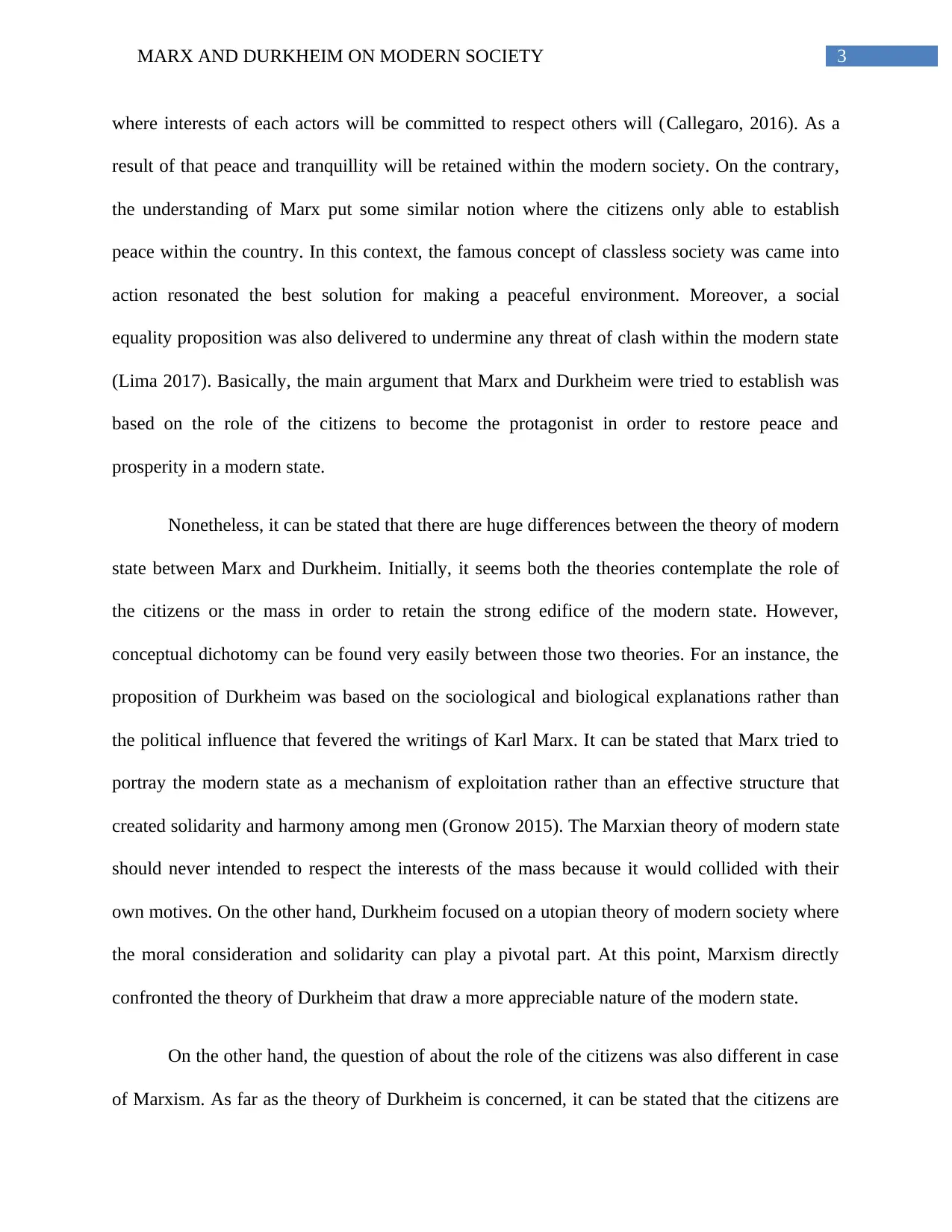
3MARX AND DURKHEIM ON MODERN SOCIETY
where interests of each actors will be committed to respect others will (Callegaro, 2016). As a
result of that peace and tranquillity will be retained within the modern society. On the contrary,
the understanding of Marx put some similar notion where the citizens only able to establish
peace within the country. In this context, the famous concept of classless society was came into
action resonated the best solution for making a peaceful environment. Moreover, a social
equality proposition was also delivered to undermine any threat of clash within the modern state
(Lima 2017). Basically, the main argument that Marx and Durkheim were tried to establish was
based on the role of the citizens to become the protagonist in order to restore peace and
prosperity in a modern state.
Nonetheless, it can be stated that there are huge differences between the theory of modern
state between Marx and Durkheim. Initially, it seems both the theories contemplate the role of
the citizens or the mass in order to retain the strong edifice of the modern state. However,
conceptual dichotomy can be found very easily between those two theories. For an instance, the
proposition of Durkheim was based on the sociological and biological explanations rather than
the political influence that fevered the writings of Karl Marx. It can be stated that Marx tried to
portray the modern state as a mechanism of exploitation rather than an effective structure that
created solidarity and harmony among men (Gronow 2015). The Marxian theory of modern state
should never intended to respect the interests of the mass because it would collided with their
own motives. On the other hand, Durkheim focused on a utopian theory of modern society where
the moral consideration and solidarity can play a pivotal part. At this point, Marxism directly
confronted the theory of Durkheim that draw a more appreciable nature of the modern state.
On the other hand, the question of about the role of the citizens was also different in case
of Marxism. As far as the theory of Durkheim is concerned, it can be stated that the citizens are
where interests of each actors will be committed to respect others will (Callegaro, 2016). As a
result of that peace and tranquillity will be retained within the modern society. On the contrary,
the understanding of Marx put some similar notion where the citizens only able to establish
peace within the country. In this context, the famous concept of classless society was came into
action resonated the best solution for making a peaceful environment. Moreover, a social
equality proposition was also delivered to undermine any threat of clash within the modern state
(Lima 2017). Basically, the main argument that Marx and Durkheim were tried to establish was
based on the role of the citizens to become the protagonist in order to restore peace and
prosperity in a modern state.
Nonetheless, it can be stated that there are huge differences between the theory of modern
state between Marx and Durkheim. Initially, it seems both the theories contemplate the role of
the citizens or the mass in order to retain the strong edifice of the modern state. However,
conceptual dichotomy can be found very easily between those two theories. For an instance, the
proposition of Durkheim was based on the sociological and biological explanations rather than
the political influence that fevered the writings of Karl Marx. It can be stated that Marx tried to
portray the modern state as a mechanism of exploitation rather than an effective structure that
created solidarity and harmony among men (Gronow 2015). The Marxian theory of modern state
should never intended to respect the interests of the mass because it would collided with their
own motives. On the other hand, Durkheim focused on a utopian theory of modern society where
the moral consideration and solidarity can play a pivotal part. At this point, Marxism directly
confronted the theory of Durkheim that draw a more appreciable nature of the modern state.
On the other hand, the question of about the role of the citizens was also different in case
of Marxism. As far as the theory of Durkheim is concerned, it can be stated that the citizens are
Paraphrase This Document
Need a fresh take? Get an instant paraphrase of this document with our AI Paraphraser
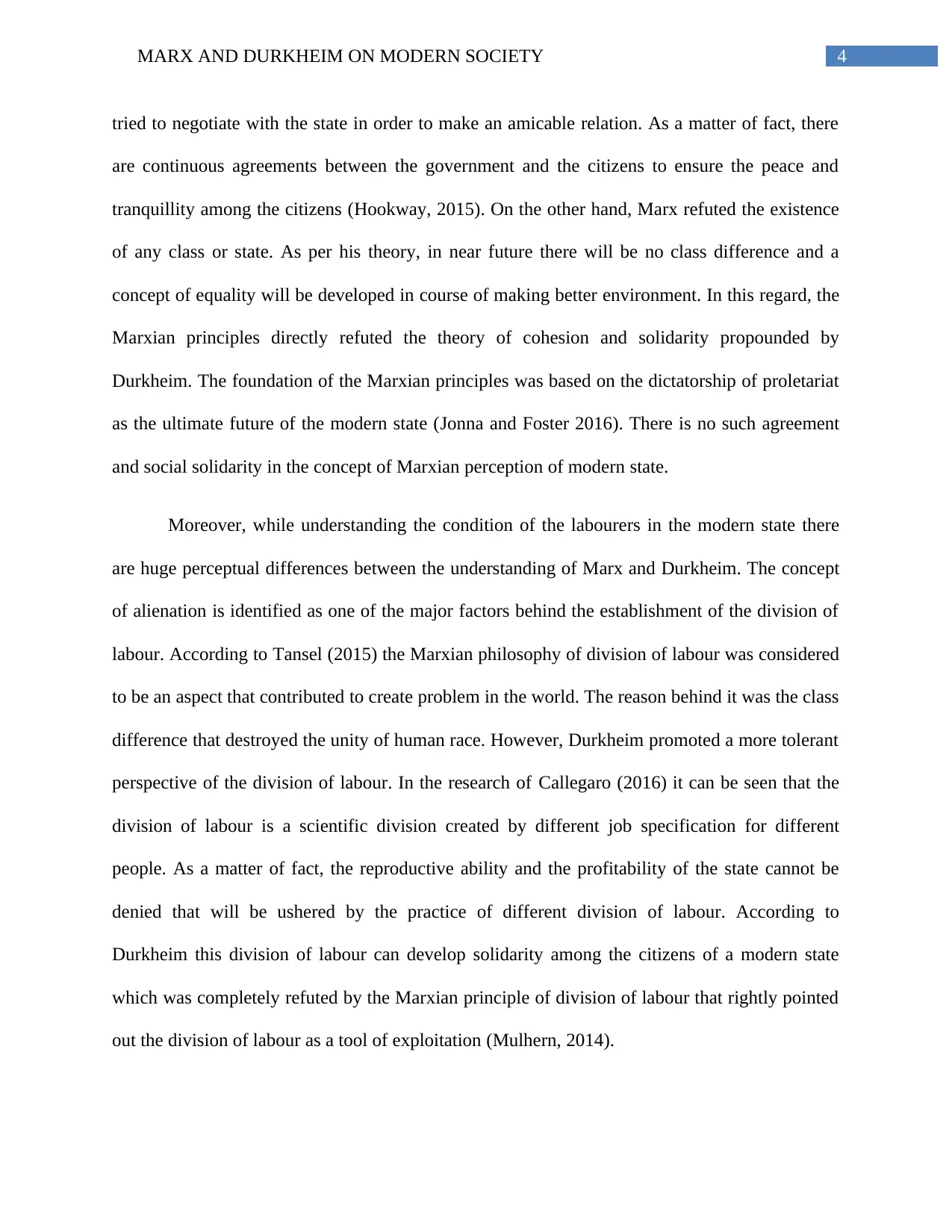
4MARX AND DURKHEIM ON MODERN SOCIETY
tried to negotiate with the state in order to make an amicable relation. As a matter of fact, there
are continuous agreements between the government and the citizens to ensure the peace and
tranquillity among the citizens (Hookway, 2015). On the other hand, Marx refuted the existence
of any class or state. As per his theory, in near future there will be no class difference and a
concept of equality will be developed in course of making better environment. In this regard, the
Marxian principles directly refuted the theory of cohesion and solidarity propounded by
Durkheim. The foundation of the Marxian principles was based on the dictatorship of proletariat
as the ultimate future of the modern state (Jonna and Foster 2016). There is no such agreement
and social solidarity in the concept of Marxian perception of modern state.
Moreover, while understanding the condition of the labourers in the modern state there
are huge perceptual differences between the understanding of Marx and Durkheim. The concept
of alienation is identified as one of the major factors behind the establishment of the division of
labour. According to Tansel (2015) the Marxian philosophy of division of labour was considered
to be an aspect that contributed to create problem in the world. The reason behind it was the class
difference that destroyed the unity of human race. However, Durkheim promoted a more tolerant
perspective of the division of labour. In the research of Callegaro (2016) it can be seen that the
division of labour is a scientific division created by different job specification for different
people. As a matter of fact, the reproductive ability and the profitability of the state cannot be
denied that will be ushered by the practice of different division of labour. According to
Durkheim this division of labour can develop solidarity among the citizens of a modern state
which was completely refuted by the Marxian principle of division of labour that rightly pointed
out the division of labour as a tool of exploitation (Mulhern, 2014).
tried to negotiate with the state in order to make an amicable relation. As a matter of fact, there
are continuous agreements between the government and the citizens to ensure the peace and
tranquillity among the citizens (Hookway, 2015). On the other hand, Marx refuted the existence
of any class or state. As per his theory, in near future there will be no class difference and a
concept of equality will be developed in course of making better environment. In this regard, the
Marxian principles directly refuted the theory of cohesion and solidarity propounded by
Durkheim. The foundation of the Marxian principles was based on the dictatorship of proletariat
as the ultimate future of the modern state (Jonna and Foster 2016). There is no such agreement
and social solidarity in the concept of Marxian perception of modern state.
Moreover, while understanding the condition of the labourers in the modern state there
are huge perceptual differences between the understanding of Marx and Durkheim. The concept
of alienation is identified as one of the major factors behind the establishment of the division of
labour. According to Tansel (2015) the Marxian philosophy of division of labour was considered
to be an aspect that contributed to create problem in the world. The reason behind it was the class
difference that destroyed the unity of human race. However, Durkheim promoted a more tolerant
perspective of the division of labour. In the research of Callegaro (2016) it can be seen that the
division of labour is a scientific division created by different job specification for different
people. As a matter of fact, the reproductive ability and the profitability of the state cannot be
denied that will be ushered by the practice of different division of labour. According to
Durkheim this division of labour can develop solidarity among the citizens of a modern state
which was completely refuted by the Marxian principle of division of labour that rightly pointed
out the division of labour as a tool of exploitation (Mulhern, 2014).
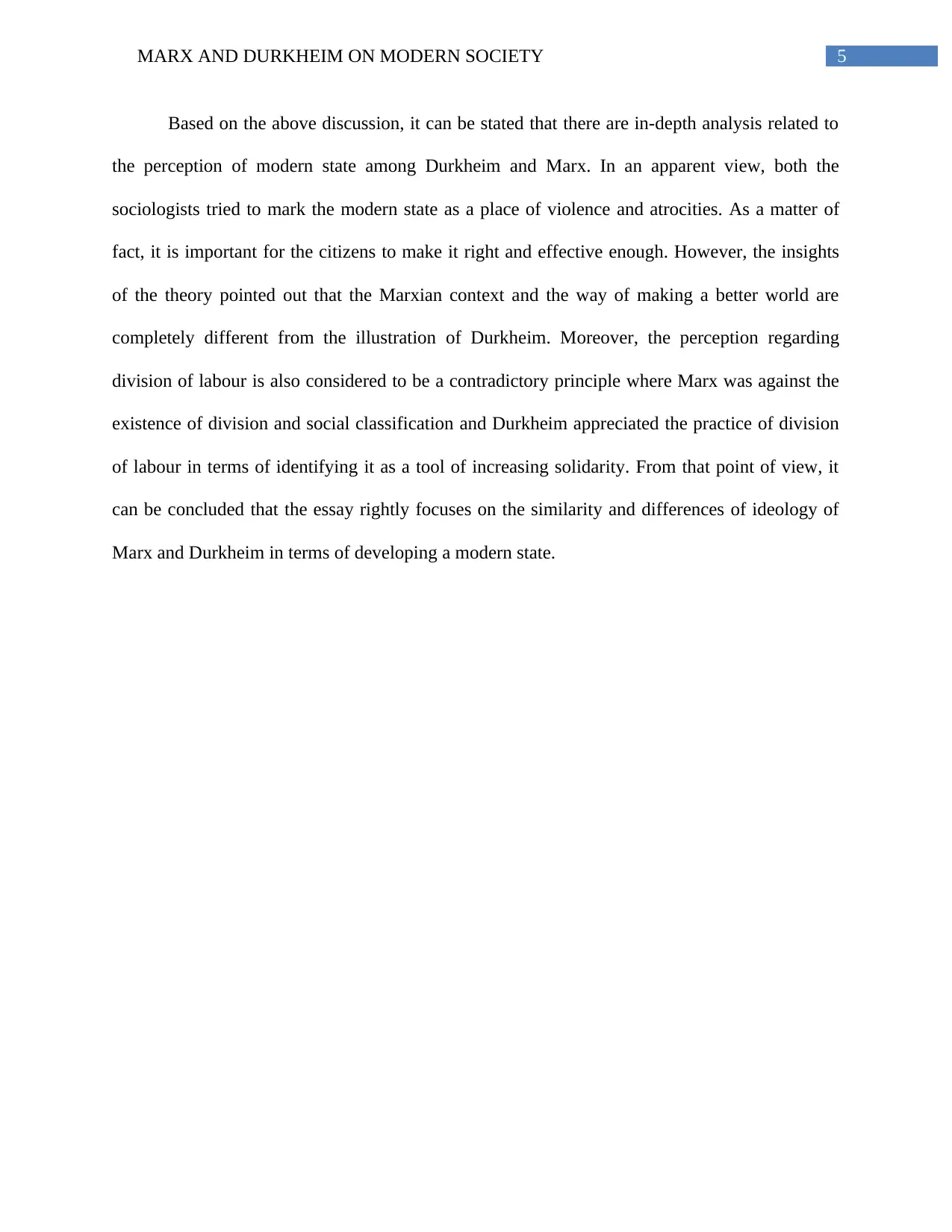
5MARX AND DURKHEIM ON MODERN SOCIETY
Based on the above discussion, it can be stated that there are in-depth analysis related to
the perception of modern state among Durkheim and Marx. In an apparent view, both the
sociologists tried to mark the modern state as a place of violence and atrocities. As a matter of
fact, it is important for the citizens to make it right and effective enough. However, the insights
of the theory pointed out that the Marxian context and the way of making a better world are
completely different from the illustration of Durkheim. Moreover, the perception regarding
division of labour is also considered to be a contradictory principle where Marx was against the
existence of division and social classification and Durkheim appreciated the practice of division
of labour in terms of identifying it as a tool of increasing solidarity. From that point of view, it
can be concluded that the essay rightly focuses on the similarity and differences of ideology of
Marx and Durkheim in terms of developing a modern state.
Based on the above discussion, it can be stated that there are in-depth analysis related to
the perception of modern state among Durkheim and Marx. In an apparent view, both the
sociologists tried to mark the modern state as a place of violence and atrocities. As a matter of
fact, it is important for the citizens to make it right and effective enough. However, the insights
of the theory pointed out that the Marxian context and the way of making a better world are
completely different from the illustration of Durkheim. Moreover, the perception regarding
division of labour is also considered to be a contradictory principle where Marx was against the
existence of division and social classification and Durkheim appreciated the practice of division
of labour in terms of identifying it as a tool of increasing solidarity. From that point of view, it
can be concluded that the essay rightly focuses on the similarity and differences of ideology of
Marx and Durkheim in terms of developing a modern state.
⊘ This is a preview!⊘
Do you want full access?
Subscribe today to unlock all pages.

Trusted by 1+ million students worldwide
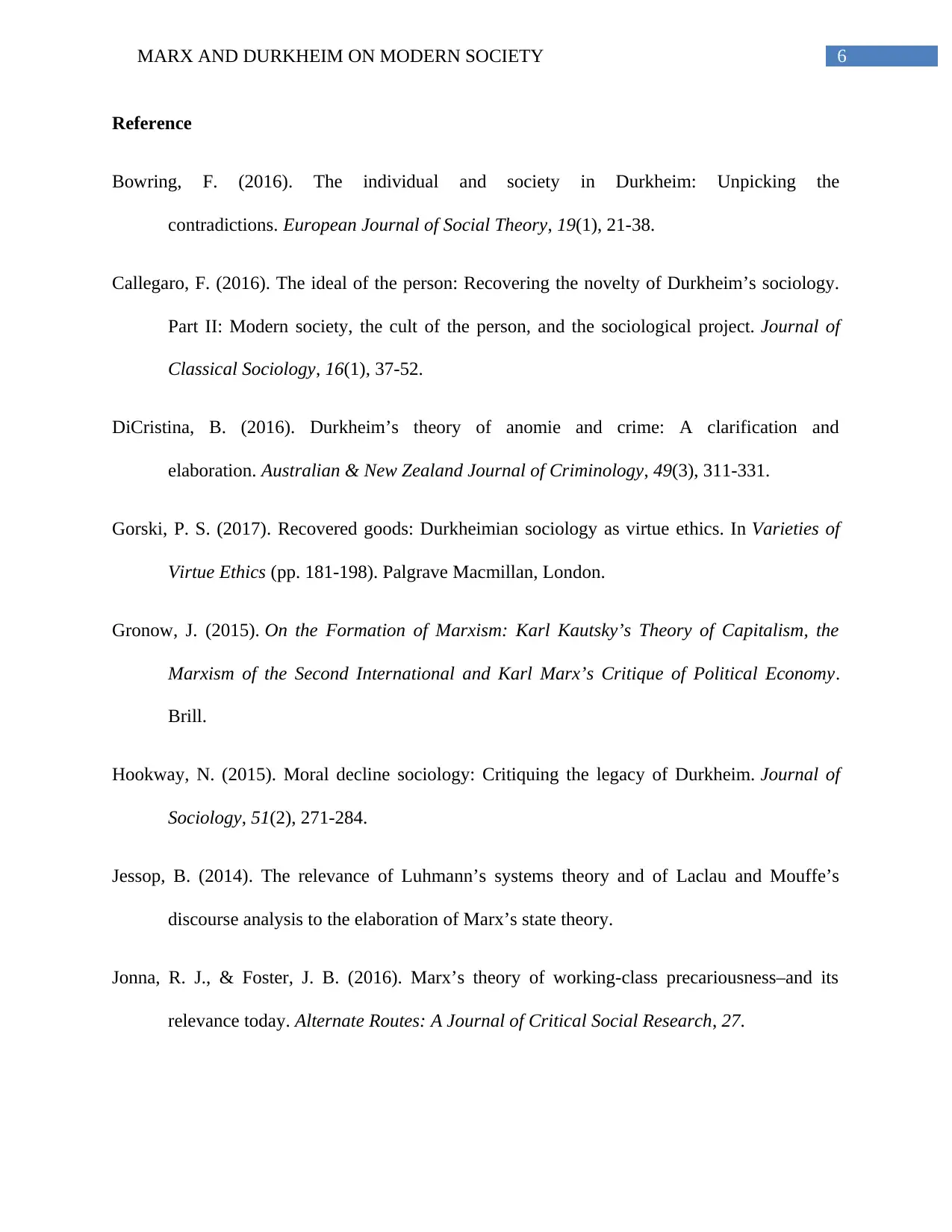
6MARX AND DURKHEIM ON MODERN SOCIETY
Reference
Bowring, F. (2016). The individual and society in Durkheim: Unpicking the
contradictions. European Journal of Social Theory, 19(1), 21-38.
Callegaro, F. (2016). The ideal of the person: Recovering the novelty of Durkheim’s sociology.
Part II: Modern society, the cult of the person, and the sociological project. Journal of
Classical Sociology, 16(1), 37-52.
DiCristina, B. (2016). Durkheim’s theory of anomie and crime: A clarification and
elaboration. Australian & New Zealand Journal of Criminology, 49(3), 311-331.
Gorski, P. S. (2017). Recovered goods: Durkheimian sociology as virtue ethics. In Varieties of
Virtue Ethics (pp. 181-198). Palgrave Macmillan, London.
Gronow, J. (2015). On the Formation of Marxism: Karl Kautsky’s Theory of Capitalism, the
Marxism of the Second International and Karl Marx’s Critique of Political Economy.
Brill.
Hookway, N. (2015). Moral decline sociology: Critiquing the legacy of Durkheim. Journal of
Sociology, 51(2), 271-284.
Jessop, B. (2014). The relevance of Luhmann’s systems theory and of Laclau and Mouffe’s
discourse analysis to the elaboration of Marx’s state theory.
Jonna, R. J., & Foster, J. B. (2016). Marx’s theory of working-class precariousness–and its
relevance today. Alternate Routes: A Journal of Critical Social Research, 27.
Reference
Bowring, F. (2016). The individual and society in Durkheim: Unpicking the
contradictions. European Journal of Social Theory, 19(1), 21-38.
Callegaro, F. (2016). The ideal of the person: Recovering the novelty of Durkheim’s sociology.
Part II: Modern society, the cult of the person, and the sociological project. Journal of
Classical Sociology, 16(1), 37-52.
DiCristina, B. (2016). Durkheim’s theory of anomie and crime: A clarification and
elaboration. Australian & New Zealand Journal of Criminology, 49(3), 311-331.
Gorski, P. S. (2017). Recovered goods: Durkheimian sociology as virtue ethics. In Varieties of
Virtue Ethics (pp. 181-198). Palgrave Macmillan, London.
Gronow, J. (2015). On the Formation of Marxism: Karl Kautsky’s Theory of Capitalism, the
Marxism of the Second International and Karl Marx’s Critique of Political Economy.
Brill.
Hookway, N. (2015). Moral decline sociology: Critiquing the legacy of Durkheim. Journal of
Sociology, 51(2), 271-284.
Jessop, B. (2014). The relevance of Luhmann’s systems theory and of Laclau and Mouffe’s
discourse analysis to the elaboration of Marx’s state theory.
Jonna, R. J., & Foster, J. B. (2016). Marx’s theory of working-class precariousness–and its
relevance today. Alternate Routes: A Journal of Critical Social Research, 27.
Paraphrase This Document
Need a fresh take? Get an instant paraphrase of this document with our AI Paraphraser
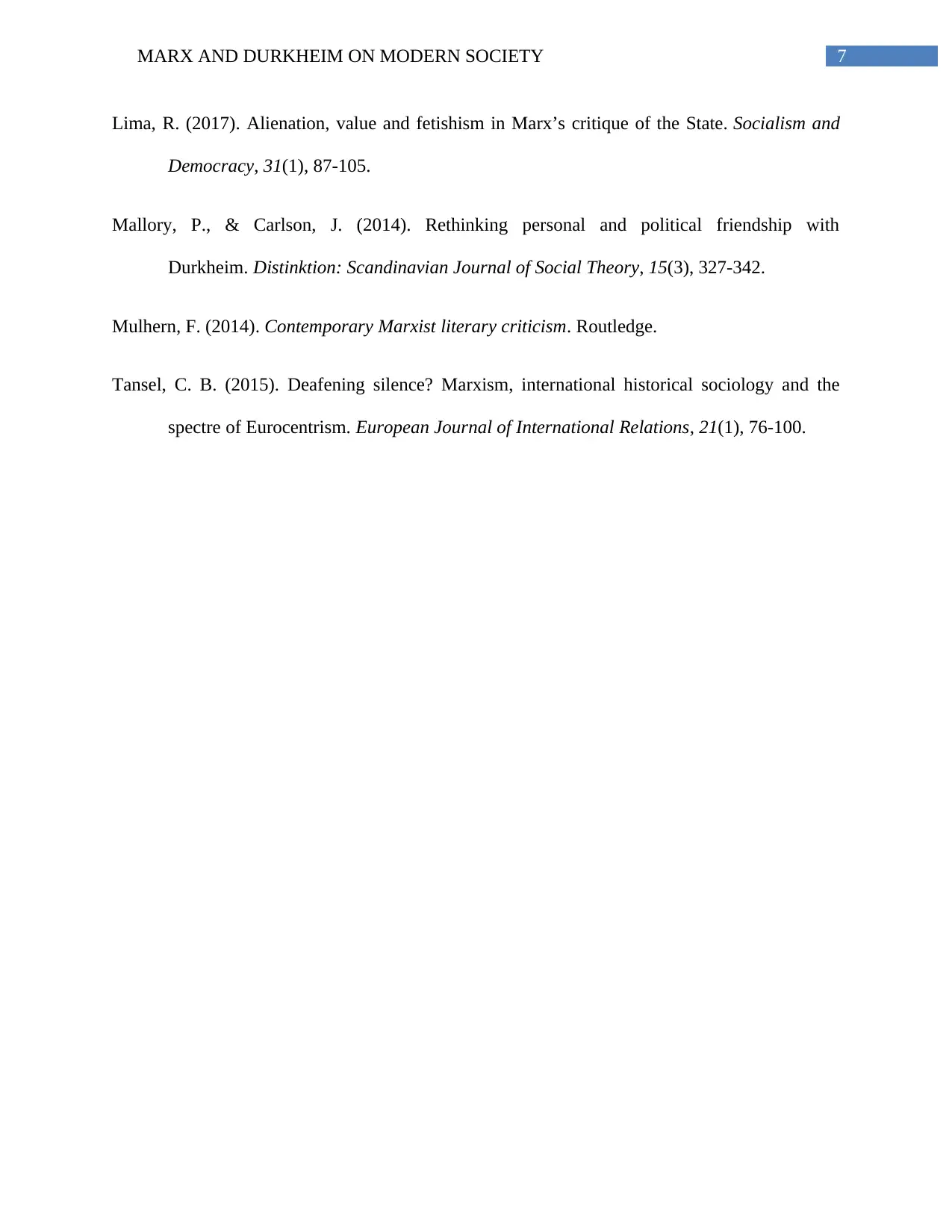
7MARX AND DURKHEIM ON MODERN SOCIETY
Lima, R. (2017). Alienation, value and fetishism in Marx’s critique of the State. Socialism and
Democracy, 31(1), 87-105.
Mallory, P., & Carlson, J. (2014). Rethinking personal and political friendship with
Durkheim. Distinktion: Scandinavian Journal of Social Theory, 15(3), 327-342.
Mulhern, F. (2014). Contemporary Marxist literary criticism. Routledge.
Tansel, C. B. (2015). Deafening silence? Marxism, international historical sociology and the
spectre of Eurocentrism. European Journal of International Relations, 21(1), 76-100.
Lima, R. (2017). Alienation, value and fetishism in Marx’s critique of the State. Socialism and
Democracy, 31(1), 87-105.
Mallory, P., & Carlson, J. (2014). Rethinking personal and political friendship with
Durkheim. Distinktion: Scandinavian Journal of Social Theory, 15(3), 327-342.
Mulhern, F. (2014). Contemporary Marxist literary criticism. Routledge.
Tansel, C. B. (2015). Deafening silence? Marxism, international historical sociology and the
spectre of Eurocentrism. European Journal of International Relations, 21(1), 76-100.
1 out of 8
Related Documents
Your All-in-One AI-Powered Toolkit for Academic Success.
+13062052269
info@desklib.com
Available 24*7 on WhatsApp / Email
![[object Object]](/_next/static/media/star-bottom.7253800d.svg)
Unlock your academic potential
Copyright © 2020–2026 A2Z Services. All Rights Reserved. Developed and managed by ZUCOL.





